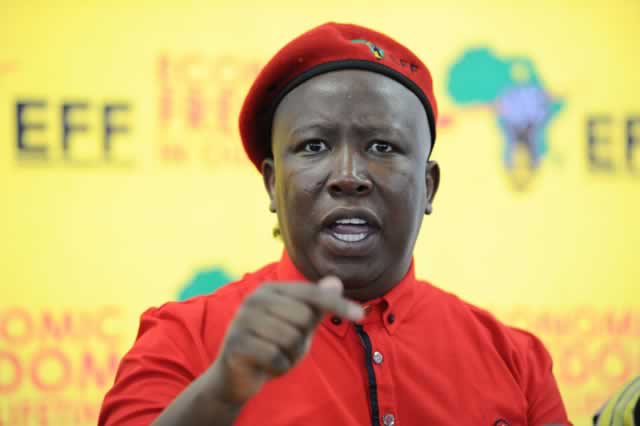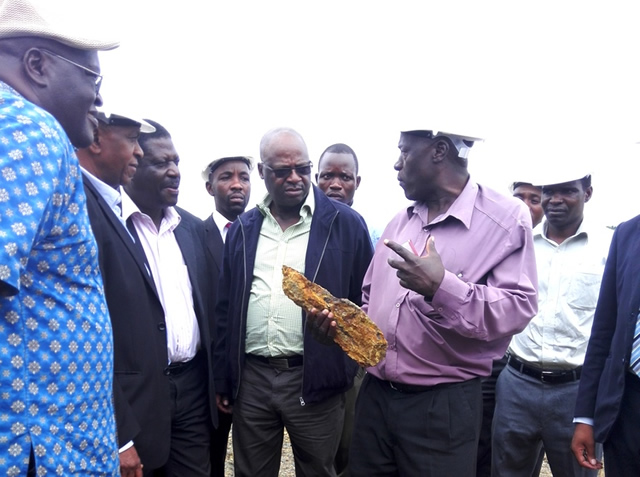SA: In what condition is the state of the nation?

Pusch Commey Correspondent
The EFF’s entry into South Africa’s hallowed chambers has meant much more than giving the ANC (in power for the last two decades), a hefty reality check
JULIUS Malema and his Economic Freedom Fighters’ dramatic exploits in parliament have been whipping up unprecedented focus and interest in the post-apartheid, interracial South African National Assembly.
This month’s State of the Nation address by President Jacob Zuma was therefore ripe for drama. As Pusch Commey reports, at the bottom of it all is the condition South Africa finds itself in, 20 years into political freedom.
It was telling when Julius Malema’s newly formed Economic Freedom Fighters (EFF) won 25 seats in the 400-seat ANC-dominated parliament in May 2014. For a new party renowned largely for punching the ruling party below the belt in political street fights, pundits and critics presumed that the EFF in parliament would just be a tame horse, saddled by the rules of parliament. But they were all in for a major surprise.
The EFF’s entry into South Africa’s hallowed chambers has meant much more than giving the ANC (in power for the last two decades), a hefty reality check.
In the full glare of the media, for the past nine months the world has watched embarrassing political clashes reminiscent of a tavern brawl, right inside the respected House, as the EFF harangued, even mocked the ANC and its leader Jacob Zuma in many parliamentary debates and proceedings, especially the infamous Nkandlagate.
In scenes never experienced in 20 years since apartheid ended, the ANC, which has 238 seats in the House, has at times been reduced to ridicule and left to spectate as Malema and his colleagues have torn the ruling party apart, demanding that it be more economically accountable to the majority poor: black South Africans.
Many observers say what has been happening in the South African parliament at the hands of the EFF is simply an extension of the reality on the ground outside it.
Since ascending to his current status as leader of the EFF, having been expelled from the ANC for insubordination, Malema’s version of political populism, and his message of economic freedom for black South Africans, has resonated with the electorate, as poverty, unemployment and inequality continue to hog the headlines, and it remains at the heart of South Africa’s post-apartheid political discourse.
But the ANC has not been all bad news for the country, as its critics (including Malema) would like the world to believe.
To a large extent, the black-majority ruling party has upheld the rule of law. It has had its political challenges since coming to power, but most have been overcome.
However, it is on the question of poverty, inequality and unemployment that it has struggled to find a satisfactory solution, especially on the question of massive inequalities between blacks and whites.
After 20 years of black rule, about 10 percent of the whites still control 95 percent of the economy. And the thorny issue of the same 10 percent whites owning about 80 percent of South Africa’s best land, remains unresolved. Meanwhile, it is generally acknowledged that corruption, especially in the state-controlled sectors, has spiralled out of control in recent years.
Inequality and poverty is why the use of R246 million ($25 million) of taxpayers’ money on Zuma’s private homestead (Nkandla), passed off as security upgrades, struck such a raw nerve among the populace. An investigation by the Public Protector Thuli Madonsela recommended that the president pay back a portion for non-security upgrades, valued at R20 million ($1,9 million). However, the president has refused to admit liability and will not “pay back the money” — a mantra that has become the EFF’s rallying call in every parliamentary session, but one which has also reverberated across the country.
A parliament of “fouls”
The EFF’s brash behaviour in parliament has widely been condemned as crude, but one thing is for sure — their unruly behaviour has drawn an intense public and global focus onto the country’s parliament.
Since the last heated question-time in August, when EFF parliamentarians, who wear their trademark red berets and workers’ overalls into parliament, rowdily chanted “pay back the money”, forcing a rattled President Zuma to leave the chamber, he has not returned to parliament.
Many more shocking events in parliament have amused the nation and the world at large, including riot police being called in to intervene. There have been scuffles and brawls. Some MPs have ended up in hospital for treatment. During debates there has been foul language used and middle fingers shown at opposing MPs.
Documents have been torn to shreds in front of Press cameras. An attempt by Deputy President Cyril Ramaphosa to calm the situation at a joint meeting of all parties failed. A disciplinary hearing was called to deal with the issues, but the opposition boycotted it. Matters were made worse when the ANC adopted a one-sided report that cleared Zuma of any wrongdoing in the Nkandla saga and declared that he was not liable, and therefore, need not “pay back the money”.
But according to insiders, 2015 is the year the ANC has decided it will no longer tolerate an opposition, whose combined strength is only 37 percent of the electoral votes, that keeps bringing parliament into disrepute. But in Malema’s camp, this is the year to scale up their rabble-rousing.
Strange bedfellows
But also interesting in the parliamentary saga is the rare, eyebrow-raising show of a united opposition, particularly the curious solidarity formed between two ideological foes, the EFF and the white-led Democratic Alliance (DA). In the parliamentary fights they have closed ranks and adopted common positions, with MPs from either camp supporting each other, at times to the hilt. Some DA parliamentarians even physically intervened to defend the EFF when riot police were called in. It was some of the party’s MPs that had to receive hospital treatment. Indeed, as they say, politics makes strange bedfellows.
Not so long ago, Julius Malema’s acerbic tongue lashed out at the DA leader Helen Zille — who he once described as a “racist little girl” — when he referred to black women in the DA (who included the outspoken former DA parliamentary leader Lindiwe Mazibuko) as “tea ladies”. Zille scathingly traded these insults back.
Therefore, the two parties suddenly beginning to cosy up in parliament is quite a turnaround. For example, there was the week that both EFF and DA parliamentarians refused to respect the authority of the Speaker, Baleka Mbete, and the sanctity of the chair itself, arguing that she cannot be an honest and impartial broker as she also sits as the chairperson of the ruling party ANC. She was asked to step down, but stood her ground. Consequently, her rulings and those of her deputies have been met with open defiance and in some cases, Mbete has had to deal with foul and unparliamentary language and catcalling.
But as the second and third biggest opposition parties, a united front makes political sense. The DA has long cherished the idea of a coalition of opposition forces to break the back of the ANC behemoth.
With the firepower that the EFF brings, the opposition is seemingly punching far above its weight. There are many reasons as to why this political dalliance is being questioned. For example, the EFF’s policy position of land redistribution, and the nationalisation of key sectors of the economy, stand in stark contrast to the stance of the centre-right DA.
And while another reason may lie in the political principle of “divide and rule”, which works well when the numbers are not on your side, it has long been said by political pundits that the only way the ANC’s liberation strength can be tamed is if it implodes from within and splits up.
However, the ANC has been able to survive internal fissures, the most serious of which was the formation of COPE (Congress of the People), which emerged after the recall of President Thabo Mbeki in 2008. In the 2009 elections they performed well, with 30 members of parliament and 7,42 percent cent of the vote. Since then the party has imploded amid leadership struggles. COPE now has less than 1 percent of the votes and two seats in the current parliament. Most of its members have re-defected into the cooler tent of the ANC.
The DA, on the other hand, has a solid electoral base among the white and mixed race population in Western Cape Province.
The biggest problem, however, is their inability to secure black votes. Demographics and identity politics play a huge role in a country that is about 80 percent black, and with a history of discrimination drawn along colour lines. Conversely, the ANC has only been able to attract about 1 percent of white votes. If the rising EFF manages to seriously dent the ANC, the balance of forces would make the DA stronger as they consolidate their base and stump for black votes.
They have consistently elected young black parliamentary leaders who speak the language of the majority black electorate and have sought to promote blacks into positions of power, albeit while retaining real control. In the Western Cape the mixed race (Coloured) vote helped the Mayor of Cape Town, Patricia de Lille, who was once a centre-left politician of the withered Pan African Congress (PAC), secure her office.
Meanwhile, the ANC, at its birthday bash on 10 January, chose Cape Town as the venue for its 103rd anniversary celebrations.
For many, this was a tactic openly aimed at claiming control of the DA’s stronghold — the Western Cape, the only province the ANC does not run. Will the EFF go the way of COPE? It does not seem so.
Rather, they seem to be growing stronger. At their first annual Party Congress in December 2014, the event went smoothly, with Malema being elected party president unopposed, and choosing his preferred candidates in top positions.
Talk of dissent and divisions within the EFF quickly fizzled out amid reconciliatory speeches. Although it remains to be seen, the EFF confidently believes it will give the ANC a serious run for the black electoral vote, come the municipal elections in 2016. Apart from its public-pleasing mantra — “we will overthrow economic apartheid” — the EFF believes another of its advantages is that it honed its political skills within the ANC, so it is a case of “knowing the enemy”.
Interestingly, in his keynote speech at the ANC’s 103rd anniversary bash, a feisty Jacob Zuma was accused of sounding just like Malema and stealing from the EFF book, when he spoke of de-racialisation of the economy, land redistribution, the pain of apartheid, pan-Africanism and economic freedom, using all the vote-catching revolutionary talk that propelled Malema to his current status. Whether this attempt to co-opt EFF policies will translate into reality remains to be seen. After all, Malema’s EFF does not carry the burden of governance.
But when parliament re-opened this month and President Zuma delivering his State of the Nation speech, there was a lot to expect. The main question is, however: what condition will the state of the nation and its parliament be in, in 2015?
Pusch Commey is a barrister of the High Court of South Africa, award- winning writer and associate editor of New African Magazine since 1999. He is based in Johannesburg, South Africa. He is the author of nine books including the best selling “100 Great African Kings and Queens” and “Tofi’s Fire Dance”. He is also the CEO of the South African-based Real African Publishers and the founder of the Real African Writers Series. This article is reproduced from NewAfrican magazine.









Comments